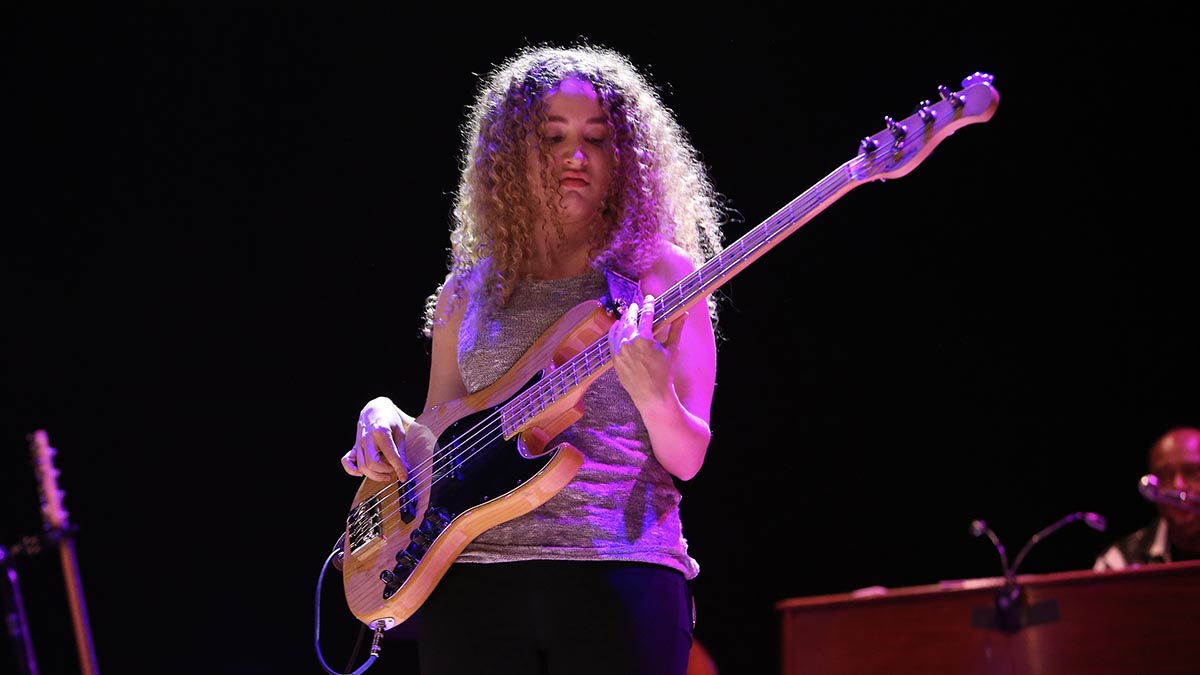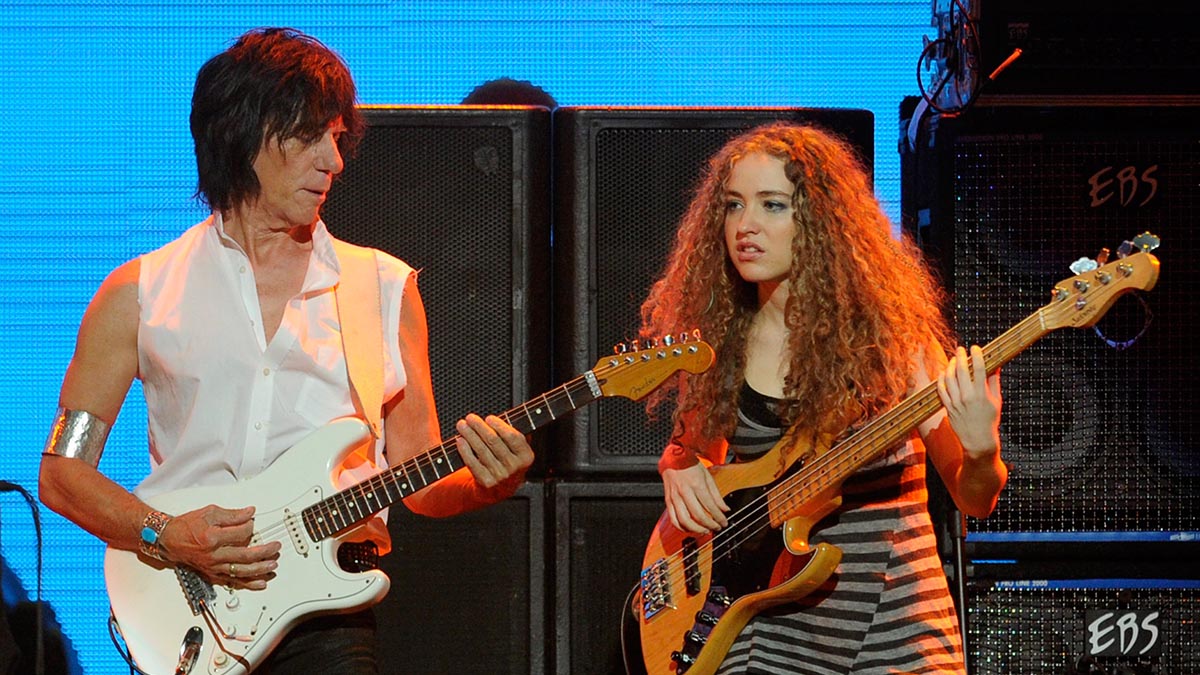Tal Wilkenfeld: “Take improvising one step at a time. Don’t think too far ahead, otherwise it’s not genuinely reacting to the moment”
The Australian bass sensation on how stand-up comedy can inform your playing and approach to songwriting

Tal Wilkenfeld first caught the global bass community’s attention back in 2007, when a bass solo with Jeff Beck went viral. Her jazz sensibilities, combined with impeccable groove, time, and phrasing, caught the imaginations of aspiring and professional bassists worldwide.
And Tal is all big smiles and even bigger hair as we talk about her recent solo album, Love Remains.
“I started off as a singer,” she tells BP. “I first picked up the guitar when I was 14, and when I got a scholarship to a music school in America, I became very focused on instrumental music. I was all about getting to know the neck of my instrument and how to improvise, and being more of a skilled musician, and so I stopped singing.
“Then after years went by, when I was playing bass with various groups all round the world, I decided I wanted to get back into singing and songwriting again. For me, playing instrumental music was safer, in a way, because I could emotionally express whatever was going on without assigning words to it.”
She goes on to mention her love of poetry and the lyrical skills of Bob Dylan and Leonard Cohen, which begs the question of how she finds singing while playing bass. “It’s never been a challenge for me,” she replies, “because I also play the drums, and I always did funny exercises when I was a lot younger, and put in hours of practice. I would do these independence exercises where I would be playing something repeatedly while having a conversation on top of it.”
This is a trick that Divinity Roxx also uses, to get to a place where she can sing over whatever she’s playing. “I didn’t know that that was what I was doing, but I was doing it. I thought if I could hold a conversation and keep playing, then that was forming independence. I’ve always been interested in that – singing and playing different rhythms.”
Tal made the switch from guitar to bass at the age of 17, she explains. “I wasn’t really allowed to practice when I was younger, because I grew up in a very strict household and the focus was academia, so when I moved to the States I started playing all the time and messed my hands up.
Get The Pick Newsletter
All the latest guitar news, interviews, lessons, reviews, deals and more, direct to your inbox!
“I actually stopped playing guitar for a while because I’d hurt myself from practicing too much. After that I thought, ‘When I get back [to Australia, her home country] I should be a bass player,’ and everyone else thought so too, because I kept slapping the guitar and doing really rhythmic stuff. I kept going to the drum rooms, and I’d kick the students out and just start bashing with one hand. I was definitely a rhythm section player.”
I actually stopped playing guitar for a while because I’d hurt myself from practicing too much
Love Remains has more of a grunge and acoustic singer-songwriter feel, in stark comparison to her 2007 instrumental album Transformation, which was dripping in jazz and funk sensibilities and blistering bass solos.
She explains: “In that moment of writing the song, it does influence the arrangement, but that arrangement can easily change. It’s really a vehicle for getting the song out of you. It can end up being irrelevant if you choose for it to be, or you can decide that ‘the instrument I wrote this song on, and the part that I came up with, works so well with this lyric or this melody that I would like to keep it.’

“I actually did that with most of the songs on the record. The album was recorded live, so that’s what informed the decision of which instrument I tracked with. On song, Haunted Love, I wrote on a five-string bass, which was tuned E to high C, and I put a capo on the third fret and I wrote the song like that, as I wanted some open strings ringing out.
“When I was done with the song it just didn’t really need anything else, and I thought it had a really interesting sound, just having the bass being the accompanying instrument. The only thing I added to it was some background vocals and an orchestra.”
With all that in mind, everyone knows what a great improviser Tal is. I wonder how she approaches that skill? “I’m sensing my way through it,” she says. “You start somewhere and you let that inform your next action and your next action, one step at a time.
“Don’t think too far ahead, otherwise it’s not genuinely reacting to the moment. Play a note – I don’t know where it comes from; something told me to play this note here – so now what do I do? You’re constantly responding to the last thing you just played. That’s my approach to improvisation.”
So what is she playing all these songs on? “I only really play my Sadowsky on Haunted Love. I used to play Sadowskys exclusively until I started making my record and realizing that I wanted to have vintage, passive instruments. My Fender Precision is a 1969, and I have a Harmony H22, which I bought off somebody that I knew in LA. I’ve got vintage Ampeg SVTs, too, but I’m always changing. I haven’t figured out the rig thing out. I can’t quite seem to land upon something that I’m totally happy with.
“The old Ampegs are amazing: vintage instruments have time to age, so they have a different sound to them. No two are alike. I have a couple of TC Electronic pedals, a delay and a reverb, which I have some custom sounds on. I have an EBS Octabass pedal that I sometimes use, and I have a SansAmp on my pedalboard.”
Who are her influences? “I loved Anthony Jackson: he became a mentor. I would never really listen to a bass player to inspire my bass playing, though – oftentimes it’s going to be someone playing a different instrument, or not even a musician at all, that inspires me.

“My latest inspiration is stand-up comedy. I’m absolutely obsessed with it, and LA is a great place to watch live stand-up comedy. I’ll just go around and watch these guys for hours.
“The way that it feeds me in my inspiration, and the way that I approach music, has changed as a result of watching these guys. The way that they improvise, the way they read the room, where they choose to put their jokes, the way they develop a joke... all that kind of stuff makes complete sense to me.
“There’s a complete connection there. You put a lot of effort into crafting your jokes and then you have to be flexible enough to know, ‘I need to shorten this, I need to discard this, this isn’t working, this part needs to go here,’ and all those same things happen when you’re playing bass.
“A song will work one night, but it won’t work another night. You’d do this same thing exactly the same twice, and one crowd will love it – and one crowd will hate it.”
- Love Remains is out now via BMG.
“I asked him to get me four bass strings because I only had a $29 guitar from Sears”: Bootsy Collins is one of the all-time bass greats, but he started out on guitar. Here’s the sole reason why he switched
“I got that bass for $50 off this coke dealer. I don’t know what Jaco did to it, but he totally messed up the insides!” How Cro-Mags’ Harley Flanagan went from buying a Jaco Pastorius bass on the street to fronting one of hardcore’s most influential bands













